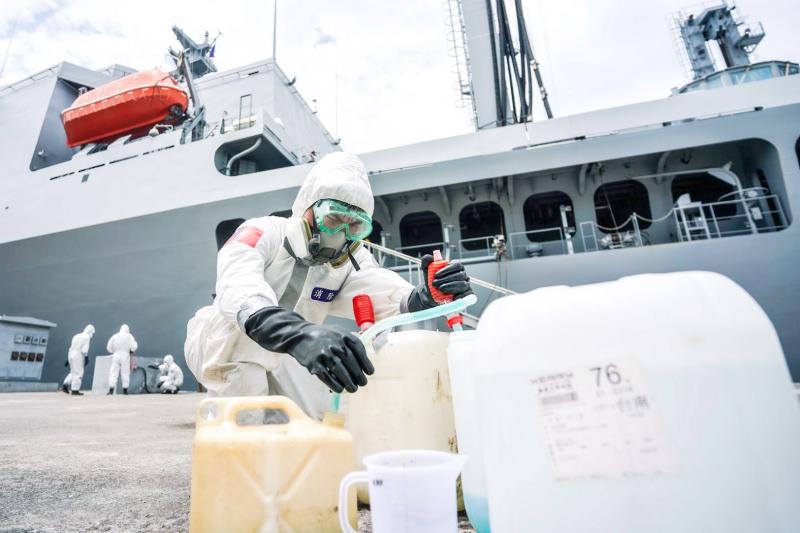Twenty-two new COVID-19 cases have been confirmed, with 21 coming from the navy supply ship Panshih (磐石) and one imported case, the Central Epidemic Command Center (CECC) said yesterday.
The navy cases are 19 men and two women, with ages ranging from their 20s to 40s, Minister of Health and Welfare Chen Shih-chung (陳時中), who heads the center, said at the center’s news conference in Taipei.
The imported case is a man in his 20s who studies in the US and who developed symptoms on April 10. He returned to Taiwan on Friday, where he reported his condition to an airport quarantine officer and was tested.
The Panshih, the frigate Kang Ding (康定) and guided-missile frigate Yueh Fei (岳飛) made a “Friendship Flotilla” visit to Palau from March 12 to 15 and returned to Kaohsiung on April 9.
All personnel aboard the three ships remained on board the vessels after they docked for six days to comply with CECC quarantine requirements and did not disembarked until Wednesday.
The CECC on Saturday reported three confirmed COVID-19 cases, all men in their 20s who had interned on the Panshih and sought treatment after disembarking.
A total of 744 officers, sailors and students who had been on the flotilla were immediately recalled for testing and centralized quarantine on Saturday.
Test results found 24 confirmed cases, including the three reported on Saturday, on the Pashin — six with symptoms and 18 asymptomatic — who have been put into isolation in hospitals, Chen said.
The others are quarantined at six quarantine facilities and one military camp, he said.
The CECC on Saturday evening sent care-service text messages to all 744, and yesterday sent test messages to notify more than 2,000 people who had had direct contact with crew members that they needed to perform self-health management for 14 days.
The places that the 24 confirmed cases had stayed between Wednesday and Saturday would be made public, Chen said.
Detailed information on their whereabouts would be provided to local governments for disinfection and disease prevention measures, he added.
While investigations on the source of infection of the 24 and their contacts are being conducted, the CECC would not classify them as imported or domestic cases, he said.
Bowing to reporters at the news conference, Navy Command Headquarters Chief of Staff Vice Admiral Mei Chia-shu (梅家樹) apologized on behalf of the navy.
“Our Friendship Flotilla did not do a good job in disease prevention during this year’s training operation,” he said.
“We will do our best to take care of the infected crew and care for their family members,” he added.
In response to reporters’ questions about photographs posted on Facebook by the Republic of China embassy in Palau that showed crew members not wearing masks, Mei said that after consultations with the embassy, and knowing there were no confirmed COVID-19 cases in Palau, the crew did not wear masks at official events, outdoor sports and performances, but did so when they were off-duty.
The crew members’ health was evaluated by a group of health professionals on Tuesday, and their temperatures were checked before they disembarked on Wednesday, he said.
Chen said that most of the 24 cases from the ship are young people who did not have clear symptoms when they arrived at the quarantine facilities, and the center thinks the risk of community spread caused by this cluster is low, but it is still taking the outbreak seriously and reacted immediately to prevent further spread of the disease.
While some people have questioned whether there was an attempt to cover up the shipboard cases, Taiwan’s success in preventing community spread of COVID-19 so far has been achieved by the trust between patients and health departments, Chen said.
The public needs to understand that individuals’ perception of symptoms can vary, so people who have contracted the virus should not be condemned, as long as they are honest when helping with the contact investigations, he said.
Chang Shan-chwen (張上淳), convener of the CECC advisory specialist panel, said considering the timing of the onset of symptom in the 24 confirmed cases, there could have been more than one wave of infections on the vessels, so antibody blood tests might be conducted to try to clarify the possible source of infection.
Source: Taipei Times - 2020/04/20





















